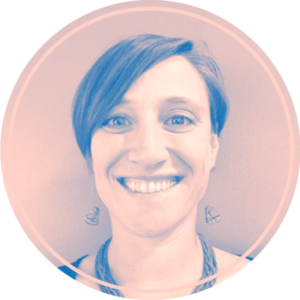 Where are you from?
Where are you from?
I was born in Chicago, but moved to eastern Kentucky when I was a baby. From there, my family moved to West Virginia. After college, I followed my older brother out West and now I’m a transplanted San Franciscan.
What’s your specialty or area of expertise?
I’m a proud Family Physician. I specialize in care of patients living with and affected by HIV, especially cis- and transgender women and their families. I also specialize in family planning and reproductive health. Despite these areas of expertise, I still consider myself a generalist and focus on providing high quality comprehensive primary care.
What first inspired you to become a doctor?
My parents are both doctors, so it was a pretty obvious career choice. My dad used to take me to “take your daughter to work day” when I was in elementary school, and I was blown away by the connections he had with his patients. He would always come home excited about his work and the people he had the privilege to treat. That was what I wanted in my career.
What story about one of your patients most sticks with you?
A lot of patients have had an indelible mark on me. In both HIV care and abortion care, I am often seeing patients who don’t have a lot of opportunities to tell their stories. I feel incredibly fortunate to be able to take part in my patients’ lives and be entrusted with their health and their complicated life stories. I have always been interested in helping women avoid pregnancy and parenting when it’s not the right time, but my work with HIV-affected families has also taught me the importance of helping people who want to parent do so safely and with joy and support. There is one family who I will never forget. I became the primary care provider for a woman, who does not have HIV, and her male partner, who does have HIV. They had been told that it would be irresponsible and dangerous to try to have a baby, and they came to our clinic for a second opinion. Over months, I worked with them to get his viral load undetectable and reassure them both that, with proper precautions, the risk of HIV transmission to her and, by extension, to their baby, was essentially zero. I will never forget the electric feeling in the air when I delivered their healthy, HIV-negative, baby girl and handed her over to her exhausted mom. I was so happy that they had brought me into their family so that I could help them create the family they wanted.
What current policy issue especially motivates you to be an advocate?
I have a naive belief that the world should be a fair place. It isn’t, but I’m always working to try to make it a little more fair. Social programs like cash assistance, public insurance, housing subsidies, public education, and so many more, play an important role in helping to level the playing field. They are currently under constant attack. These programs need to be funded, maintained, and enacted in a way that resists racism, sexism, ableism, and all the other -isms to allow people to not just survive but rise above and thrive.
Who is your social justice hero?
It’s really hard to choose just one. All of our current movements sit on the shoulders of those who fought for justice before us—the ones who are celebrated loudly as well as the ones who are quietly forgotten. While maybe not generally considered social justice heroes, a lot of my thinking has been shaped by feminist and queer theory scholars Judith Butler, Eve Sedgwick, Anne Fausto-Sterling, and bell hooks. I am inspired by the writings of transgender theorists and activists Sandy Stone, Jamison Green, Kate Bornstein, and others.